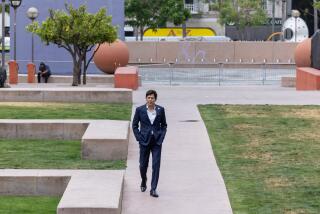H.H. Brookins dies at 86; pastor was influential black leader
The Rev. Hamel Hartford Brookins, an influential bishop and former pastor of the First African Methodist Episcopal Church of Los Angeles who became a political power broker, civil rights leader and mentor to former Mayor Tom Bradley, the Rev. Jesse Jackson and many others, has died. He was 86.
The son of Mississippi sharecroppers, Brookins rose to prominence in the 1960s and ‘70s as an articulate, self-assured champion of black political empowerment. He died Tuesday at a Los Angeles retirement center where he had been receiving hospice care, a church spokesman said. Brookins had been ill for some time.
Late in his career, Brookins came under scrutiny for alleged misuse of church and federal funds during his time as the African Methodist Episcopal Church’s presiding bishop in Los Angeles. He was dogged by similar allegations during later postings in Washington, D.C., and Arkansas. No charges were ever filed, but in 1993, Brookins resigned under pressure as the church’s leader in the Washington region. He remained a bishop of the AME church.
FOR THE RECORD:
H.H. Brookins: In the May 24 LATExtra section, the obituary of the Rev. Hamel Hartford Brookins, former pastor of the First African Methodist Episcopal Church of Los Angeles, identified two of his survivors as stepchildren: Steven Hartford Brookins and the Rev. Francine Nelson Brookins. In fact, they are Brookins’ children; they are stepchildren of his wife, the Rev. Rosalynn Kyle Brookins. —
A freewheeling religious leader with a powerful preaching style, Brookins maintained his home in Los Angeles throughout a career that took him across the United States, and frequently to Africa.
“He really was not only a fantastic religious and spiritual leader, he was a fabulous politician,” U.S. Rep. Maxine Waters (D-Los Angeles) said Wednesday, noting that hers was one of many political careers Brookins encouraged and fostered.
“His role in the black community and his understanding of how to seek power and influence at a time when we had very little is something that really should be understood and appreciated,” Waters said.
In a career spanning more than four decades, Brookins had a knack for witnessing history — or as he once told a Times interviewer: “I’ve seen it all. And I’ve been a part of 80% of it.”
He marched arm-in-arm with the Rev. Martin Luther King Jr. in the civil rights protests of the 1960s and along the way got to know Jackson, then a young lieutenant to King. While assigned to Africa in the mid-1970s, Brookins was banned from what was then white-ruled Rhodesia because of his activism on behalf of the Zimbabwe liberation movement. In 1981, the Zimbabwe government invited him to return for its first presidential inauguration.
Assigned to his denomination’s seemingly unglamorous Oklahoma-Arkansas district in the 1980s, Brookins developed a close friendship with Bill Clinton, then governor of Arkansas. When Brookins got married for the second time in 1987, Bill and Hillary Clinton were among the guests.
In 2002, the former president joined elected officials, celebrities and religious leaders at a Beverly Hills hotel to pay tribute to Brookins, praising him for his civil rights legacy and reminiscing about their time in Arkansas.
“I learned a lot by your side, had a lot of good times. But my heart will always be with you, because in sunshine and rain, you were always with me,” Clinton said at the Beverly Hilton event. “You helped me make the country a more free, better and united place.”
Born in Yazoo City, Miss., on June 8, 1925, Brookins was the seventh of 10 children. He attended tiny Campbell College in Jackson, Miss., and later graduated with a bachelor of arts degree from Ohio’s Wilberforce University and a bachelor of divinity degree from Payne Theological Seminary in Ohio.
His rise to prominence inside his church and ultimately outside it too, began in Wichita, Kan., where he landed after seminary and short stints at churches in Topeka and Lawrence, Kan. It was 1954, the year the U.S. Supreme Court declared segregated schools unconstitutional in the groundbreaking Brown vs. Board of Education case.
As a clergyman and the first black president of the area’s interracial ministerial council, Brookins helped implement a desegregation plan ordered by the court. He spoke out often and became known as a leader.
In 1965, he was transferred to First AME in Los Angeles, the denomination’s largest and most prestigious church west of St. Louis.
He quickly became the leader of the civil rights movement in Los Angeles and became the first president of the United Civil Rights Council, an umbrella group of civil rights and religious organizations. After the Watts riots in 1965, Brookins was a key spokesman for the black community, testifying before the various committees examining the unrest and its causes.
But Brookins was also becoming a political kingmaker, with Bradley his most prominent protege.
A few years after his arrival in Southern California, Brookins first helped Bradley win election to a seat on L.A.’s City Council. Then in 1973, with Brookins pushing him all the way, the shy, sometimes politically awkward Bradley was elected Los Angeles’ first black mayor. Church and political figures throughout Los Angeles have credited Brookins with shaping Bradley’s political career.
Other political figures Brookins advised or supported include former U.S. Rep. Diane Watson of Los Angeles, the first black woman elected to the state Senate, L.A. County Supervisor Kenneth Hahn, Gov. Jerry Brown, and many others seeking local or state office. He worked in presidential campaigns for John F. Kennedy, Robert F. Kennedy, Hubert Humphrey and Jimmy Carter.
And Brookins provided crucial early counsel and support to Waters in her first race for the California Assembly in 1976. “I was considered an upstart and didn’t get the support of the unions or the political establishment,” she said. “But he embraced me and helped to raise money for me.”
Of the bishop’s rich baritone and his theatrical style as a preacher, Waters said: “H.H. Brookins was the man. He was the preacher’s preacher and many in the AME church, many of the bishops who came behind him, they all tried to copy him.”
Pastor of First AME for 13 years, Brookins led the congregation through the construction of a multimillion-dollar cathedral.
But he was later investigated in Los Angeles, and in two other postings, on allegations of financial impropriety involving hundreds of thousands of dollars.
In L.A., city investigators found that Brookins on two occasions in the 1980s had disguised his ownership of an office complex to obtain government renovation loans. The Los Angeles County district attorney’s office dropped a criminal investigation of the bishop for fraud and embezzlement, later saying it had erred in doing so before the statute of limitations had elapsed in 1989.
Brookins’ survivors include his wife, the Rev. Rosalynn Kyle Brookins, who is the pastor of Walker Temple AME Church in Los Angeles; the couple’s son, Sir-Wellington Hartford Brookins; and two stepchildren, Steven Hartford Brookins and the Rev. Francine Nelson Brookins.
Details of services will be announced, a church spokesman said.
More to Read
Start your day right
Sign up for Essential California for the L.A. Times biggest news, features and recommendations in your inbox six days a week.
You may occasionally receive promotional content from the Los Angeles Times.



















































